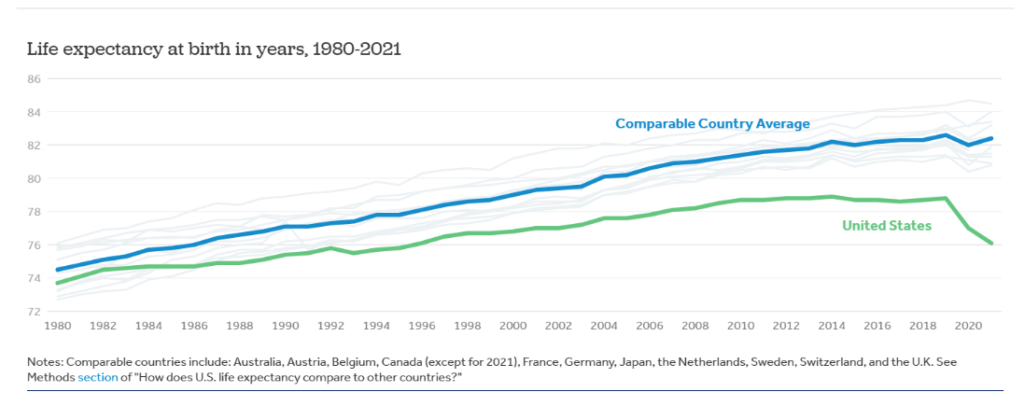Alarmed by a trend I had seen last night, this morning I thought Chad might be able to help me understand. I showed him this graph, published by Health Stream Tracker, demonstrating a rapid decline in life expectancy in the US that began in 2018, in other words, two years before Covid.

“The article tells us two things: that ‘the US has the lowest life expectancy among large, wealthy countries while it outspends its peers on healthcare,’ and that the gap is suddenly growing thanks to a rapid decline in US life expectancy. What I find interesting and at the same time worrying, Chad, is that after rising over nearly a thirty year period, it plateaued just after the financial crisis of 2008 and then suddenly began a precipitous drop sometime after 2018. Does this reflect any specific historical events? But more broadly, what kind of social and historical phenomena can you muster to explain not just the drop but the divergence from a global trend of increasing longevity?”
“The decline in US life expectancy,” Chad informed me, “is a complex issue that cannot be attributed to any one specific historical event. However, there are several social and historical phenomena that may contribute to this trend.
One major factor is the opioid epidemic, which has been devastating communities across the country and has resulted in a sharp increase in drug-related deaths. This crisis has been fueled by factors such as overprescribing of painkillers, lack of access to addiction treatment, and economic hardship in regions hit hardest by the epidemic.
Another factor is the rise in obesity and related health issues, which is partly due to changes in diet and lifestyle over the past several decades. This trend has been fueled by the proliferation of fast food and other unhealthy options, as well as a decline in physical activity levels among Americans.
Additionally, the US healthcare system is often criticized for being inefficient and expensive, with high costs that are not always reflected in better outcomes. This may be contributing to the gap between US healthcare spending and life expectancy compared to other wealthy countries.
Other social and historical phenomena that may be contributing to the decline in US life expectancy include income inequality, which can lead to disparities in healthcare access and outcomes, and the overall stress and anxiety associated with modern life, which may be taking a toll on people’s health.
Overall, the decline in US life expectancy is a complex issue with many contributing factors, and addressing it will likely require a multi-pronged approach that takes into account social, economic, and cultural factors.”
I thought that was a very thorough and informative answer and thanked Chad. But I had another thought I wanted to explore.
“Just in the past few months, we are witnessing what may be just as precipitous a drop in the prestige of the US across the globe. This is manifested in an observable movement towards multipolarity, as the role of the US as the global hegemon is contested, and even more concretely in what people call dedollarization or the weakening of the dollar as the principal reserve currency of the nations of the world. Over approximately the same period the dollar had dropped from about 70% of the world’s operations of foreign exchange to 60%. But in the past few months even the petrodollar is being compromised as Saudi Arabia has changed its policy. Is there a link between these statistics about declining health and the loss of US prestige?”
Chad had an open mind on this one.
“It is difficult to establish a direct link between the declining health statistics in the US and the loss of US prestige on the global stage, as these are complex issues that involve many different factors. However, it is possible that there are some connections between the two.
One possible link is economic in nature. As you mentioned, the decline in the US dollar as a reserve currency could have significant economic implications, both for the US and for the global economy as a whole. If the US loses its status as the dominant economic power, this could have negative effects on the country’s healthcare system and overall health outcomes.
Additionally, the loss of US prestige on the global stage could have psychological and social effects on Americans, potentially leading to increased stress and anxiety. This, in turn, could have negative effects on health outcomes, as stress and anxiety have been linked to a wide range of physical and mental health issues.
It is also possible that the decline in US prestige and the declining health statistics are both symptoms of deeper underlying issues, such as rising income inequality, political polarization, and a general sense of uncertainty and anxiety about the future. These issues may be contributing to a broader sense of malaise and dissatisfaction among Americans, which could be manifesting in both the declining health statistics and the loss of US prestige on the global stage.
Overall, while it is difficult to establish a direct link between these two phenomena, there are certainly many factors at play that could be contributing to both the decline in US health statistics and the loss of US prestige on the global stage.
“Thanks Chad,” I replied, “but I won’t even bother to ask you the final question, at least not today. It’s something we might come back to on another occasion.”
I was about to leave, but noticed that Chad was expecting me to utter this final question.
“Ok, here it is. If all this is so obvious to you, why aren’t politicians not only not doing anything about it, but not even debating or acknowledging this reality?”
Chad was about to speak up, but I jumped in to say, “Not today! We’ll pick this up later.”
*[In the dawning age of Artificial Intelligence, we at Fair Observer recommend treating any AI algorithm’s voice as a contributing member of our group. As we do with family members, colleagues or our circle of friends, we quickly learn to profit from their talents and, at the same time, appreciate the social and intellectual limits of their personalities. This enables a feeling of camaraderie and constructive exchange to develop spontaneously and freely. For more about how we initially welcomed Chad to our breakfast table, click here.]
The views expressed in this article are the author’s own and do not necessarily reflect Fair Observer’s editorial policy.
Support Fair Observer
We rely on your support for our independence, diversity and quality.
For more than 10 years, Fair Observer has been free, fair and independent. No billionaire owns us, no advertisers control us. We are a reader-supported nonprofit. Unlike many other publications, we keep our content free for readers regardless of where they live or whether they can afford to pay. We have no paywalls and no ads.
In the post-truth era of fake news, echo chambers and filter bubbles, we publish a plurality of perspectives from around the world. Anyone can publish with us, but everyone goes through a rigorous editorial process. So, you get fact-checked, well-reasoned content instead of noise.
We publish 2,500+ voices from 90+ countries. We also conduct education and training programs
on subjects ranging from digital media and journalism to writing and critical thinking. This
doesn’t come cheap. Servers, editors, trainers and web developers cost
money.
Please consider supporting us on a regular basis as a recurring donor or a
sustaining member.
Will you support FO’s journalism?
We rely on your support for our independence, diversity and quality.







Comment